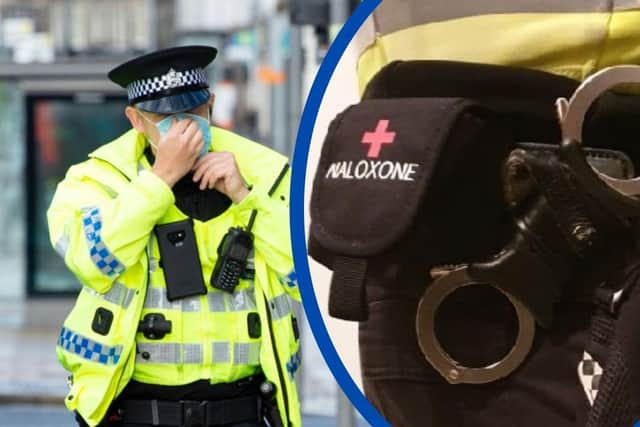Scottish police officers use Naloxone spray on overdose patient for first time
Naloxone is a nasal spray designed to reverse opioid-related drug overdoses.
The constables managed to stabilise a man’s condition using the spray in Glasgow’s East End on Tuesday night, before paramedics arrived and took over the emergency medical care.
Advertisement
Hide AdAdvertisement
Hide AdThe officers were carrying Naloxone kits on their utility belts as part of a voluntary six-month Police Scotland trial.
The pilot comes in response to drug deaths in Scotland being classified as a public health emergency.
Figures published by the National Records for Scotland (NRS) showed that in 2019 there were 1,264 drug-related deaths in Scotland - an increase of six per cent on the previous year and the highest total since recording began in 1996.
Assistant Chief Constable Gary Ritchie, Head of Drug Strategy for Police Scotland, said he was “proud” of the officers who used the spray on Tuesday night.
He said: “Their quick thinking, having only completed their training a few hours before, has clearly saved a life which may have otherwise been lost.


“We have since learned the patient left hospital later that same night and we have highlighted this incident to our community partners who support people living with addiction.
“It is heartening that the vast majority of our officers who have received training have disregarded the misinformation which has been presented about naloxone from some quarters.
“Clearly operational officers recognise that naloxone is a safe, simple way to help people who may be dying from an overdose and are willing to be involved in a pilot to see how beneficial it is to have police officers carrying it more widely.
Advertisement
Hide AdAdvertisement
Hide AdHe added: “This first administration is an early indication of the potential value that police carrying Naloxone could have in helping people who use drugs, as well as their families, friends and communities.
“However, the test of change has only just begun and we will continue to monitor and assess the value over the next six months.
“This will take place with the support of an external team of academics at Edinburgh Napier University who will independently evaluate the entire process.”
Police Constables, Sergeants and Inspectors in Glasgow and Falkirk have been taking part in Naloxone training since Monday, March 1, with officers from Dundee City set to join them in coming weeks.
Strategy Co-ordinator for Drug Death Prevention at the Sottish Drugs Forum, Kirsten Horsburgh also welcomed the news.
She said: “SDF is highly supportive of this Police Scotland initiative to support ongoing naloxone efforts across the country.
“Police are often present at overdose incidents, which may provide an opportunity for naloxone to be administered without delay, prior to an ambulance attending.
“Naloxone has been used by lay people in Scotland for more than ten years, potentially saving thousands of lives.
Advertisement
Hide AdAdvertisement
Hide Ad“During a crisis such as we have in relation to drug deaths, we require support and assistance from all partners who may witness an overdose.
“To see the immediate benefit of police carriage of naloxone at such an early stage in the project is extremely positive and hugely encouraging.
She added: “We thank the officers involved for their quick thinking and actions.”